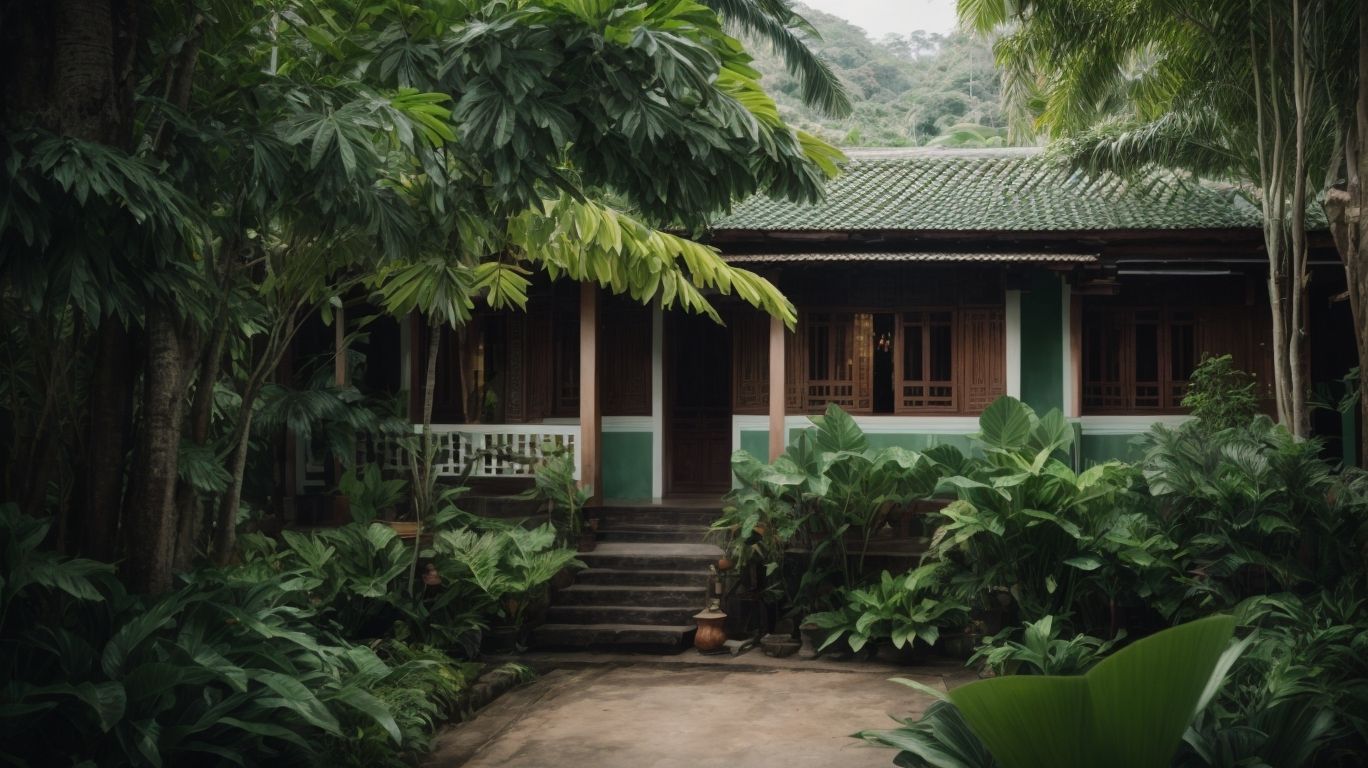
Are you tired of the usual rat race and looking for a change of pace? Look no further than the mesmerizing land of Thailand, where the expatriate lifestyle awaits to be explored. Indulge in the vibrant culture, delicious cuisine, and endless adventures in this tropical paradise. Discover why Thailand should be your next destination.
What Is an Expatriate?
An expatriate, also known as an expat, is an individual who lives in a country other than their native one. Expatriates typically relocate for various reasons, such as work opportunities, retirement, or lifestyle changes. They often embrace the local culture while maintaining connections to their home country. Expatriates can have a significant influence on the communities they join, contributing to economic growth, cultural diversity, and international exchange.
Fun fact: Did you know that according to the United Nations, nearly 244 million people worldwide are currently living as expatriates?
Why Do People Choose to Live as Expatriates in Thailand?
Expatriate life in Thailand has become increasingly popular, with more and more individuals and families choosing to make this Southeast Asian country their new home. But what exactly draws people to this lifestyle? In this section, we will explore the main reasons behind the influx of expatriates in Thailand. From the lower cost of living to the access to exotic culture and cuisine, each factor plays a significant role in the decision to live as an expatriate in Thailand.
1. Lower Cost of Living
Living as an expatriate in Thailand offers the advantage of a lower cost of living. To make the most of this benefit, here are some steps to follow:
- Research affordable areas to live, such as suburbs or smaller cities.
- Consider sharing accommodations or renting a smaller space to save on housing expenses.
- Shop at local markets and street vendors for inexpensive groceries and meals.
- Utilize public transportation or consider purchasing a scooter instead of owning a car.
- Take advantage of free or low-cost recreational activities, such as exploring temples or visiting national parks.
By being mindful of your spending and making strategic choices, you can enjoy a comfortable lifestyle while taking advantage of Thailand’s lower cost of living.
2. Better Quality of Life
Living as an expatriate in Thailand offers a higher quality of life compared to other countries. Here are some steps to enhance your quality of life while living as an expatriate in Thailand:
- Access to affordable healthcare and excellent medical facilities.
- Experience a lower cost of living, allowing you to stretch your budget further.
- Enjoy a more relaxed and laid-back lifestyle.
- Experience a warm climate and beautiful natural surroundings.
- Indulge in delicious and diverse cuisine.
- Explore a vibrant and welcoming expat community.
3. Access to Exotic Culture and Cuisine
Living as an expatriate in Thailand provides access to a vibrant and diverse culture and cuisine. To fully experience this exotic culture, follow these steps:
- Explore Traditional Thai Cuisine: Taste local dishes like Pad Thai, Tom Yum Goong, and Green Curry.
- Visit Local Markets: Immerse yourself in the sights, sounds, and smells of bustling Thai markets, such as Chatuchak Market in Bangkok.
- Participate in Festivals: Celebrate Thai festivals like Songkran (Thai New Year) and Loy Krathong (Festival of Lights).
- Learn Thai Customs: Study Thai etiquette, such as the wai greeting and removing shoes before entering homes or temples.
- Engage in Cultural Activities: Take Thai cooking classes, learn traditional Thai dance, or attend a Muay Thai boxing match.
Pro-tip: Embrace the local food scene by trying street food, as it offers a unique taste of Thai flavors and culinary traditions.
What Are the Challenges of Living as an Expatriate in Thailand?
As more and more individuals choose to live abroad, the expatriate lifestyle has become a popular topic of discussion. In particular, Thailand has been a top destination for expats due to its affordable cost of living and welcoming culture. However, living as an expatriate in Thailand also comes with its own set of challenges. In this section, we will delve into the key challenges that expats may face while living in Thailand, including the language barrier, cultural differences, and visa and work permit requirements. Understanding these challenges can help expats better prepare for their new life in Thailand.
1. Language Barrier
One of the main challenges of living as an expatriate in Thailand is the language barrier. Here are some steps to overcome this obstacle:
- Learn the basics: Start by learning basic Thai phrases and greetings to communicate with locals.
- Take language classes: Enroll in language courses or hire a tutor to develop your speaking and comprehension skills.
- Practice with locals: Engage in conversations with Thai people to practice your language skills and gain confidence.
- Utilize language apps: Make use of language learning apps and online resources to supplement your language studies.
- Immerse yourself: Immerse yourself in the local culture, watch Thai movies, listen to Thai music, and try to use the language in your daily life.
In Thailand, it’s important to make an effort to learn the language as it will greatly enhance your experience and interactions with the local community.
2. Cultural Differences
Living as an expatriate in Thailand comes with its own set of challenges, including navigating cultural differences. It is crucial to understand and adapt to these differences for a smooth transition. Cultural norms, traditions, and social etiquette may vary from one’s home country, potentially leading to misunderstandings or conflicts. Approaching these differences with an open mind and willingness to learn is important.
Expats can benefit from learning about Thai customs, traditions, and values, as it can help them integrate into the local community and foster positive relationships. Embracing the cultural diversity and showing respect towards Thai culture can greatly enhance the expatriate experience.
3. Visa and Work Permit Requirements
To obtain a visa and work permit in Thailand as an expatriate, follow these steps:
- Research the specific requirements for your visa and work permit based on your situation.
- Gather the necessary documents, including a valid passport, employment contract, and educational certificates.
- Submit your application to the Thai embassy or consulate in your home country.
- Participate in any required interviews or meetings.
- Pay the applicable fees, which may vary depending on the type of visa and work permit being applied for.
- Wait for your application to be approved and processed.
- Once approved, collect your visa and work permit.
John, an expatriate from the US, followed these steps to obtain his visa and work permit in Thailand. He successfully secured a job and was able to legally work and live in the country, enjoying the vibrant culture and beautiful landscapes.
What Are the Popular Expat Destinations in Thailand?
As one of the top destinations for expatriates, Thailand offers a unique and diverse lifestyle that attracts people from all over the world. In this section, we will take a closer look at the most popular expat destinations in the country. From the bustling capital city of Bangkok to the picturesque town of Chiang Mai and the stunning beaches of Phuket, each destination has its own charm and appeal for expats. So let’s dive in and discover the different experiences that these cities have to offer for those seeking the expatriate lifestyle in Thailand.
1. Bangkok
Bangkok, the capital city of Thailand, offers expatriates a vibrant and exciting lifestyle. Here are some steps to consider when preparing for an expatriate lifestyle in Bangkok:
- Research the city: Familiarize yourself with the culture, customs, and local amenities of Bangkok.
- Financial preparation: Save enough money to cover living expenses, housing, and any unexpected costs.
- Obtain necessary documents: Ensure you have a valid passport, visa, and any required work permits for your stay in Bangkok.
2. Chiang Mai
Chiang Mai is a popular destination for expatriates in Thailand due to its unique combination of affordability, cultural richness, and natural beauty.
- Research: Learn about the climate, cost of living, healthcare facilities, and local customs in Chiang Mai.
- Visit: Plan a trip to the city to experience Chiang Mai firsthand and determine if it suits your needs.
- Accommodation: Explore different neighborhoods in Chiang Mai to find the best area to live in, taking into consideration factors such as safety and proximity to amenities.
- Visa: Understand the visa requirements and obtain the necessary documents for a long-term stay in Chiang Mai.
- Community: Connect with other expats in the city through online forums, social media groups, and local expat events.
- Language & Culture: Familiarize yourself with basic Thai phrases and cultural norms to ease your transition and integrate into the local community in Chiang Mai.
- Healthcare: Research healthcare options and consider obtaining health insurance to ensure access to quality medical care while in Chiang Mai.
- Finances: Create a budget that accounts for living expenses, including housing, transportation, food, and entertainment in Chiang Mai.
3. Phuket
Phuket is a top expat destination in Thailand, offering a unique blend of natural beauty and modern amenities. If you’re considering living as an expatriate in Phuket, it’s important to prepare for the lifestyle by taking these steps:
- Research the area: Get to know the local culture, customs, and lifestyle in Phuket.
- Financial planning: Save enough money to cover living expenses, accommodation, and any unexpected situations.
- Obtain necessary documents: Make sure you have the appropriate visa and work permit to legally live and work in Phuket.
Following these steps will help you smoothly transition into the expatriate lifestyle in Phuket and fully enjoy your time in this vibrant city.
What Are the Common Expat Activities in Thailand?
When living as an expatriate in Thailand, there are many different activities and opportunities available to immerse oneself in the local culture and lifestyle. In this section, we will explore the most common activities among expats in Thailand, including teaching English, embracing the digital nomad lifestyle, and enjoying retirement in this vibrant country. Each of these sub-sections offers a unique perspective on the expat experience in Thailand, and we will delve into the details of each one in the following sections.
1. Teaching English
Teaching English as an expatriate in Thailand requires careful planning and preparation. Here are the steps to follow:
- Obtain a bachelor’s degree and a TEFL/TESOL certification.
- Research and apply for teaching positions through reputable agencies or schools.
- Prepare your resume, cover letter, and teaching portfolio showcasing your qualifications and experience.
- Attend interviews and demonstrate your teaching skills and cultural adaptability.
- Once hired, obtain the necessary visa and work permit to legally teach in Thailand.
- Familiarize yourself with the Thai education system and curriculum.
- Adapt your teaching style to meet the needs of Thai students.
- Engage in continuous professional development to enhance your teaching skills.
- Immerse yourself in the local culture and build relationships with colleagues and students.
One expat teacher, Sarah, followed these steps and landed a teaching position in Bangkok. She embraced the Thai culture, learned the language, and developed strong bonds with her students. Sarah’s dedication and passion for teaching English made a positive impact on her students’ lives, and she found great fulfillment in her expatriate journey in Thailand.
2. Digital Nomadism
Digital nomadism is a popular expatriate lifestyle in Thailand due to its favorable conditions for remote work. This lifestyle offers the flexibility to work from anywhere, a lower cost of living compared to Western countries, and a vibrant community of digital nomads. Cities like Bangkok, Chiang Mai, and Phuket are popular among digital nomads due to the availability of co-working spaces, affordable accommodations, and a supportive network.
To successfully transition into this lifestyle, it is crucial to research the country, save enough money to sustain oneself, and ensure all necessary documents are in order.
Sarah, a digital nomad, made the move to Thailand to pursue her passion for travel and work remotely. She found a thriving community of like-minded individuals, attended networking events, and explored the country in between work sessions. Sarah appreciated the flexibility and freedom that digital nomadism provided, allowing her to live a fulfilling life while also pursuing her career.
3. Retirement
If you’re considering retiring as an expatriate in Thailand, here are some steps to help you prepare:
- Research the country: Learn about Thai culture, customs, and retirement options available.
- Financial planning: Ensure you have enough savings and consider consulting a financial advisor to manage your retirement funds.
- Obtain necessary documents: Apply for the appropriate retirement visa and gather all required paperwork.
- Healthcare: Research the healthcare system in Thailand and consider obtaining health insurance.
- Housing: Explore different housing options, such as buying or renting property.
- Transition plan: Develop a plan for the logistics of moving to Thailand, including selling assets and organizing your belongings.
- Connect with the expat community: Join online forums or local groups to connect with other retirees and gain insights.
True story: John, a retiree from the US, followed these steps and successfully relocated to Thailand. He now enjoys the vibrant culture, warm weather, and the affordable cost of living.
How to Prepare for an Expatriate Lifestyle in Thailand?
Moving to a new country for an extended period of time can be both exciting and daunting. Thailand, with its rich culture and diverse lifestyle, is a popular choice for expatriates. But how do you prepare for such a significant change? In this section, we will discuss three essential steps to take before embarking on your expatriate journey to Thailand. From researching the country and culture to ensuring you have the necessary documents, we’ll help you feel more confident and prepared for your new life in Thailand.
1. Research the Country and Culture
Before embracing the expatriate lifestyle in Thailand, it is crucial to conduct thorough research on the country and its culture.
- Learn about the country’s history, traditions, and customs to gain a better understanding of the local culture.
- Study the Thai language or at least learn some basic phrases to facilitate communication and show respect.
- Research the local laws, regulations, and social norms to ensure compliance and avoid cultural misunderstandings.
- Explore the geography and climate of different regions in Thailand to determine which area best suits your preferences.
- Connect with expat communities, online forums, and social media groups to gain insights and advice from those who have already experienced living in Thailand.
2. Save Enough Money
When preparing for an expatriate lifestyle in Thailand, it is crucial to save enough money. Follow these steps to ensure financial readiness:
- Create a budget: Determine your monthly expenses and savings goals to understand how much you need to save.
- Reduce expenses: Cut back on non-essential spending and find ways to save money, such as cooking at home instead of eating out.
- Set up automatic savings: Set up automatic transfers from your paycheck to a savings account to ensure consistent savings.
- Explore income opportunities: Consider freelance work or remote job options to supplement your savings.
- Research cost of living: Research the cost of living in Thailand to get an estimate of how much money you will need.
3. Obtain Necessary Documents
To obtain necessary documents for living as an expatriate in Thailand, follow these steps:
- Research visa and work permit requirements for your specific situation.
- Prepare required documents, such as a valid passport, passport-sized photos, and a completed application form.
- Apply for the appropriate visa at the Thai embassy or consulate in your home country.
- Once in Thailand, visit the immigration office to extend your visa or obtain a work permit.
- Provide any additional documents or information requested by the immigration authorities.
- Keep track of your visa expiration date and renew or apply for extensions as needed.






